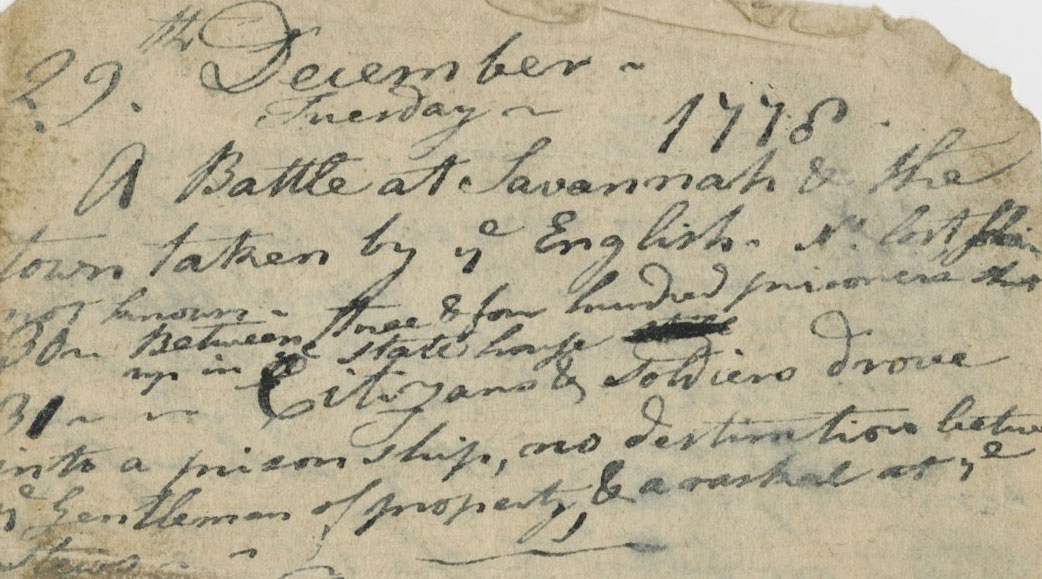Newly discovered documents, found on the dead body of a patriot pastor, show the courage of the American Revolution’s highest ranking Jew in fighting antisemitism and refusing to break his religious practice after his capture by the British
These water-stained documents were recovered from the body of his close friend, a patriotic reverend, who preached freedom from the pulpit, when he was found drowned trying to escape his own captivity
They have been in the basement of the heirs of the Reverend himself for generations and never before offered for sale
“Pork for dinner. The Jews Mr. Sheftall & son refused to eat their pieces, & their knives & forks were ordered to be greased with it. It is a happiness that Mr. Sheftall is a fellow sufferer. He bears it with such fortitude as is an example to me.”
PHILADELPHIA, PA – December 18, 2019 – The Raab Collection, the nation’s leading dealer in important historical documents, announced today that it has discovered and is offering for sale 4 water-stained pages from the diary of one of America’s most patriotic preachers, documents recovered from his body after he drowned, showing how the highest ranking Jew in the American Revolution, Mordecai Sheftall, was refused the right to practice his religion after his capture by the British and how he fought to continue his religious traditions during the harshest captivity. These unique documents tell an important and previously unknown tale, and have been in the basement of the heirs of the Reverend himself for generations.

Any documents showing Jews practicing their faith in America during the Revolution are great rarities.
“It is a privilege to carry such a powerful and evocative reminder that there are those who stood in the face of tyranny to stand up for religious freedom” said Nathan Raab, principal at The Raab Collection and author of the upcoming non-fiction book, The Hunt for History (Scribner, March 2020).
The powerful story of the Jewish leader and the patriotic Reverend: Around Christmas 1778, Sheftall and his son, along with the reverend of Georgia church Moses Allen, were arrested by the invading British army and sent to the Prison Ship Nancy. Allen was persecuted for being a parson who preached freedom from the pulpit. Sheftall and son were singled out by the British captain for being Jewish.
In early 1779, Allen tried to swim to shore and escape but drowned. When they took his body from the sea, they found 4 pages of his diary he had kept while in captivity. Those sheets not only told the story of the fall of Savannah Georgia but also of the bravery and persecution of Mordecai Sheftall. They show how Allen stood in solidarity with Sheftall. These are those pages.

Also in the group is a letter from Mordecai Sheftall and how he tried to come to the Reverend’s aid
Years later, Sheftall wrote a friend of his experience on the Prison ship, offering to give the British captain nearly all his money on hand for boards to properly bury his dead friend Rev. Allen: “Some few days after he was picked up… I offered him [the captain] two half [dollars] out of three that I had for as many boards as would make a coffin for the poor parson… yet this fellow refused to let me have the boards, saying Rebels had no business with coffins.”
This letter of Sheftall, which may be the only one ever to reach the market, comes with the diary pages.

About The Raab Collection: The Raab Collection has handled many of the most important historical documents to reach the market and worked with the families of famous Americans in the sale and preservation of their family treasures, among them Neil Armstrong, Thomas Jefferson, Ulysses S. Grant, William Henry Harrison, and Ronald Reagan. Nathan Raab, a member of the Board of Directors of the Historical Society of Pennsylvania, is also a contributor to Forbes.com. To learn more visit www.raabcollection.com or follow @raabcollection on Twitter. He is the author of the upcoming hardcover non-fiction book, The Hunt for History (Scribner, March 2020).








































































































